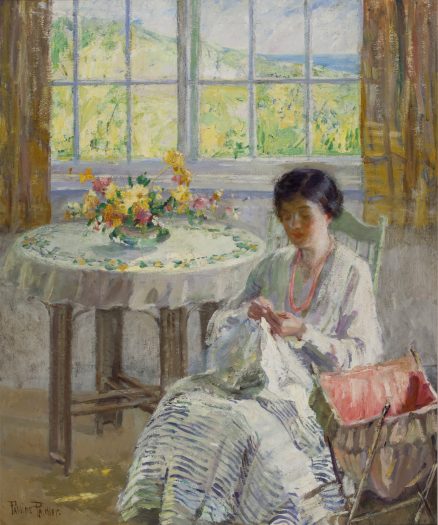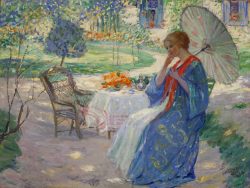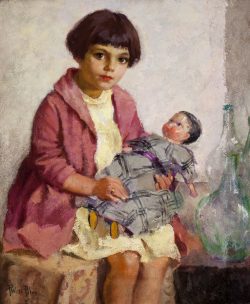- Categories
- Figural works
- Women
- Women artists
- Zoom in on Artwork
- Print Page
- Email Page to Friend
In this image, Pauline Palmer melds the pleasing color and soft light effects of modified impressionism with a subject redolent of peaceful domesticity. Seen from slightly above, a woman is seated in front of a closed window, her head barely extending above the sill. The window frames a summer landscape of rising ground yielding to a blue ocean horizon. As she bends her gaze to the crochet needle in her hand, the sitter turns her back to the sunlit scene; she seems equally oblivious of the viewer. Palmer subtly alludes to her anticipation of maternity by showing the young woman working on a small garment of a diaphanous white fabric, while at her side the open workbasket, with its frilled edges and pink-lined interior, evokes a waiting bassinet.
Artists have long posed the model before a window as a vehicle for exploring both the effects of natural light in interior spaces and the interplay of rigid architectural elements with the rounded contours of the human form. Palmer herself painted several images of women before windows or open doors. The theme of a woman engaged in handiwork embodies a timeless feminine ideal of nurturing domesticity, while allowing the viewer to contemplate the female figure as if unseen. During and just after America’s involvement in World War I, images of home life assumed poignant significance in the face of what were perceived as new threats, both internal and external, to the nation’s values and social institutions.
In this image, the plaid window curtains on the many-paned window, the white walls, and the uncarpeted floor suggest the simple interior of a summer cottage. Early in the war years, Palmer began working in picturesque Provincetown, Massachusetts, a popular artists’ haunt. Painting the local fisherfolk, quaint village scenes, and her own garden, she found the locale a rich source of subjects in which both she and her public could temporarily escape not only international conflict but also urbanization, the clamor for women’s suffrage, and other manifestations of modernity. This comforting portrayal of idealized domesticity hints little at the artist’s own defiance of conventional female roles in her busy career as a professional painter.
Wendy Greenhouse, PhD
Donated by M. Christine Schwartz to the Provincetown Art Association and Museum, Provincetown, Massachusetts, in 2021


